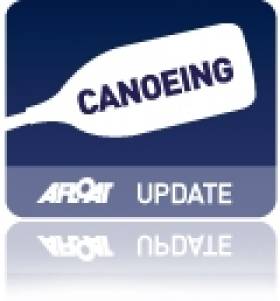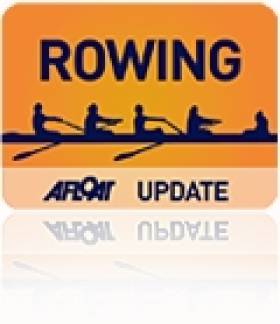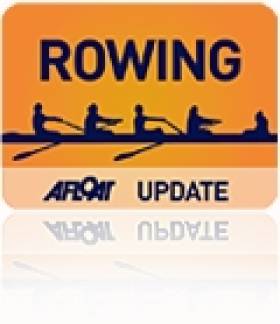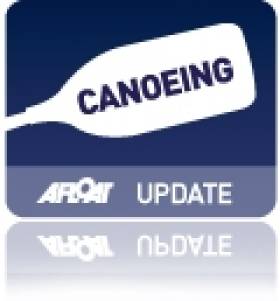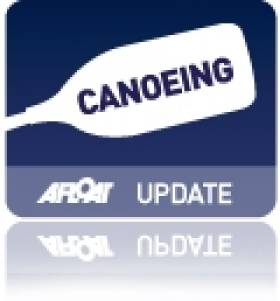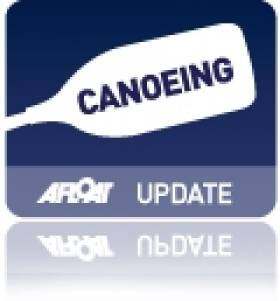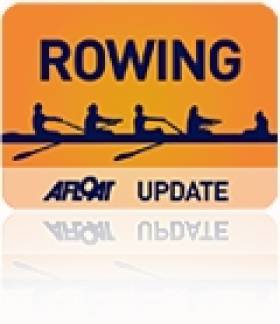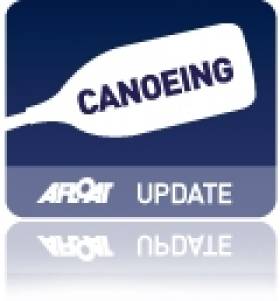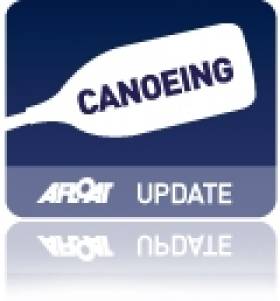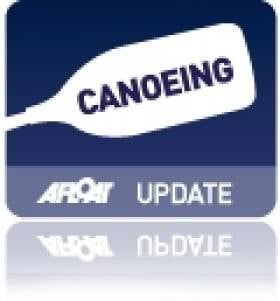Displaying items by tag: World Cup,
# CANOEING: Eoin Rheinisch and Ciaran Heurteau qualified for tomorrow’s semi-finals of the K1 at the Canoe Slalom World Cup in La Seu d’Urgell in Spain.
Both Ireland competitors did enough in their first runs in the heats to progress, but Rheinisch greatly improved his first-run ranking of 15th by clocking a hot time of 84.98 seconds in his second run to move up to fourth. Hearteau, who stood in 25th after the first round, could not improve in his second run and finished 37th overall.
Two Ireland competitors at the Canoe Sprint European Championships in Zagreb qualified for B Finals. Barry Watkins finished sixth in the semi-final of the K1 500 metres and Jenny Egan eighth in her semi-final of the women’s K1 500.
Canoe Slalom, World Cup Three, La Seu d’Urgell, Spain (Irish interest)
Men
K1 Men Heats (First 40 to Semi-Finals): 1 Australia (W Forsythe) 84.09; 4 E Rheinisch 84.98 (2nd run); 37 C Heurteau 88.03 (first run).
Canoe Sprint European Championships, Zagreb, Croatia (Irish interest)
Men
K1 1,000m – Heat One (First to Final; 2-7 to semi-final): 7 B Watkins 3 mins 59.395 seconds. Semi-Final (First Three to Final): 6 Watkins 3:38.294.
K1 500 – Heat Three (First to Final; 2-7 to semi-final): 4 Watkins 2:00.066. Semi-Final One (First Three to A Final; 4-7 and next fastest to B Final): 6 Watkins 1:42.767.
Women
K1 500
Heat Two (First to Final; 2-7 to Semi-Final): 6 J Egan 2:10.997. Semi-Finals (First Three to A Final; 4-7 and next fastest to B Final): 8 Egan 1:59.143 (qualified for B Final)
# ROWING: Sanita Puspure finished sixth in the World Cup Regatta in Munich today. Puspure had a disappointing start, while Denmark’s Fie Udby Erichsen of Denmark, in the lane beside her, shot away from the field. Puspure recovered, but by the closing stages, when Ekaterina Karsten took over the lead to win, Puspure had faded back to sixth. Emma Twigg of New Zealand took silver and Donata Vistartaite of Lithuania was third, with Erichsen having to settle for fourth.
World Cup, Munich (Irish interest)
Men
Lightweight Four: 1 Britain (P Chambers, R Williams, R Chambers, C Bartley) 6:16.34, 2 Australia 6:18.81, 3 Denmark 6:19.49.
Single Scull – A Final: 1 Germany (M Hacker) 7:07.31, 2 Sweden (L Karonen) 7:09.27, 3 Britain (A Campbell) 7:12.74.
Women
Single Scull – A Final: 1 Belarus (E Karsten) 7:52.74, 2 New Zealand (E Twigg) 7:56.22, 3 Lithuania (D Vistartaite) 7:58.60; 4 Denmark (FU Erichsen) 8:02.80, 5 Azerbaijan (N Mustafayeva) 8:09.03, 6 Ireland (S Puspure) 8:15.05.
# ROWING: Sanita Puspure moved into the A Final of the World Cup in Munich today with a steady performance which saw her finish third in the semi-final behind Nataliya Mustafayeva of Azerbaijan and Emma Twigg of New Zealand. Puspure established her hold on third by the middle stages of the race and let the top two fight it out while she saw off a challenge by Talia Gjoertz of New Zealand with an effective push.
Puspure also made the A Final in the other World Cup in which she competed, in Belgrade last month. She finished fifth.
Claire Lambe finished 15th overall in the lightweight single scull. She finished third in the C Final: leading into the closing stages, she was passed by both Anna Ioannou of Cyprus and, coming up to the line, Lila Perez Rul of Mexico.
Ireland's Adpative mixed coxed four won their B Final to finish seventh overall.
World Cup Regatta, Munich (Irish interest)
Women
Single Scull – Semi-Finals (First Three to A Final; rest to B Final) – Semi-Final One: 1 Belarus (E Karsten) 7:59.28, 2 Denmark (FU Erichsen) 8:01.68, 3 Lithuania (D Vistartaite) 8:03.58. Semi-Final Two: 1 Azerbaijan (N Mustafayeva) 8:08.36, 2 New Zealand (E Twigg) 8:12.60, 3 Ireland (S Puspure) 8:15.32; 4 Norway 8:17.43, 5 Italy 8:24.12, 6 8:26.14.
Lightweight Single – C Final (places 13 to 18): 1 Cyprus (A Ioannou) 8:05.74, 2 Mexico (L Perez Rul) 8:10.38, 3 Ireland (C Lambe) 8:14.94, 4 Hong Kong 8:17.74, 5 Croatia 8:23.63. Finland did not start.
Adpative - Legs, Trunk and Arms Mixed Coxed Four (1,000m) – B Final (Places 7, 8): 1 Ireland (AM McDaid, S Caffrey, S Ryan, K du Toit; cox: H Arbuthnot) 3:44.18, 2 Belarus 3:51.75
#CANOEING: Ciaran Heurteau first represented Ireland in 2006, but he reached new heights today when he finished fifth in the canoe slalom World Cup final in Pau in the Pyrenees.
The 24-year-old, who was brought up in Paris but has an Irish mother, qualified for the final by finishing third in the semi-final, and he competed well. Chasing an exceptional mark of 100.17 seconds set by Etienne Daille of France, Heurteau came down the course in 102.32 seconds, but he had touches on gates 12 and 24 (the second last on the course), which resulted in four seconds in time faults. Daille took gold, while Heurteau was less than a second off a bronze medal.
Canoe Slalom World Cup, Pau, France (Irish interest)
Men,
K1 Semi-Final (First 10 to Final) : 3 C Heurteau 101.74; 22 E Rheinisch 106.90
Final: 1 France (E Daille) 100.17, 2 Czech Republic (J Vondra) 101.46, 3 Australia (L Delfour) 105.40; 5 Ireland (C Heurteau) 106.32.
# CANOEING: Ciaran Heurteau gave an outstanding performance for the second day in succession to reach the final of the Canoe Slalom World Cup in Pau in France. Heurteau had finished 13th in the heats to make the semi-finals, but he bettered that this morning, finishing third in 101.74 seconds. Eoin Rheinisch also touched no gates in his round, but his time of 106.90 placed him in 22nd, with just 10 going through to the final.
Canoe Slalom World Cup, Pau, France (Irish interest)
Men, K1 Semi-Final (First 10 to Final) : 3 C Heurteau 101.74; 22 E Rheinisch 106.90
Two Irish Canoeists Progress at World Cup in France
# CANOEING: Ireland’s Ciaran Heurteau (13th) and Eoin Rheinisch (32nd) qualified for the semi-finals of the Canoe Slalom World Cup in Pau in France today. Heurteau qualified with a very good first run, while Rheinisch had to wait until his second run to qualify.
Canoe Slalom World Cup, Pau, France (Irish interest)
Men's K1 Heats (40 qualify for Semi-Final): 13 C Heurteau 91.83 (1st run); 32 E Rheinisch 93.63 (2nd run).
# ROWING: Sanita Puspure held off Germany’s Peggy Waleska to take second place in her heat and secure automatic qualification for tomorrow’s semi-final of the single scull at the World Cup regatta in Munich. The race was won well by Fie Udby Erichsen of Denmark.
Waleska is chasing selection by Germany as their representative in London 2012, but she could not catch Puspure, who was competing for the first time since she secured her spot at the Olympic Games.
Claire Lambe finished third in her heat of the lightweight single scull and third again in her repechage, where she was outsprinted for the crucial second place. The Ireland Adaptive Four missed out on an A Final place when they finished a close-up fifth in their repechage.
World Cup, Munich (Irish interest)
Women
Single Scull (First Two Directly to A/B Semi-Finals; rest to Repechages) – Heat One: 1 Belarus (E Karsten) 7:46.62, 2 Norway (T Gjoertz) 7:53.27. Heat Two: 1 Denmark (FU Erichsen) 7:46.50, 2 Ireland (S Puspure) 7:51.85; 3 Germany 7:54.79, 4 Lithuania Two 8:14.10, 6 Korea 8:18.66. heat three: 1 Azerbaijan (N Mustafayeva) 7:50.53, 2 Lithuania (D Vistartaite) 7:54.00. Heat Four: 1 New Zealand (E Twigg) 7:45.76, 2 Serbia (I Obradovic) 7:49.23.
Lightweight Single Scull, Heat Three (First Directly to A/B Semi-Final, rest to Repechage): 1 Germany (L Pless) 8:04.51; 2 Sweden 8:05.33, 3 Ireland (C Lambe) 8:17.16, 4 Finland 8:20.69, 5 Algeria 8:26.75. Repechage One (First Two to A/B Semi-Finals): 1 Switzerland (P Weisshaupt) 7:51.00, 2 Hungary (Z Hajdu) 7:54.57; 3 Ireland (Lambe) 8:01.01, 4 Mexico 8:05.48.
Adaptive - Legs, Trunk and Arms Mixed Four, coxed (1,000m) – Heat One (First to A Final; rest to Repechage): 1 Britain 3:34.42; 2 France 3:40.69, 3 Ireland (A-M McDaid, S Caffrey, S Ryan, K du Toit; H Arbuthnot) 3:48.64, 4 Belarus 3:58.35. Repechage (First Four to A Final): 1 Ukraine 3:32.65, 2 Canada 3:37.14, 3 France 3:37.16, 4 Brazil 3:40.78; 5 Ireland 3:41.04, 6 Belarus.
# CANOEING: Ireland had a fifth and a seventh place in A Finals at the Canoe Sprint World Cup in Duisburg this morning. Newly-qualified Olympian Andrzej Jezierski did not have a great start in the C1 200 metre race won by Spain’s Alfonso Benavides of Spain. Jezierski finished seventh. Barry Watkins battled well in the K1 500 metres and finished fifth in a race won convincingly by Anders Gustafsson of Sweden.
Canoe Sprint World Cup Two, Duisburg (Irish Interest)
Men
K2 200 – C Final (Places 19-27): 5 V Pierce, S Marchetti 34.156; 6 M Majchrzak, P Egan 34.201
C1 200m – A Final: 1 Spain (A Benavides) 40.685, 2 Germany (S Kiraj) 40.760, 3 Brazil (N Santos) 41.203; 7 Ireland (A Jezierski) 41.558
K1 500m – A Final: 1 Sweden (A Gustafsson) 1:41.063, 2 Germany (T Liebscher) 1:41.431, 3 Tunisia (MA Mrabet) 1:42.413; 4 Canada (B Reardon) 1:42.679, 5 Ireland (B Watkins) 1:43.526.
# CANOEING: Andrzej Jezierski won his semi-final of the C1 200 metres and moved confidently into tomorrow’s A Final at the World Cup in Duisburg in Germany. He finished second in his heat of the men’s C1 200 metres to qualify for the semi-final. Jezierski, who lives in Ballincollig in Cork, earlier this month qualified this boat for the Olympics for Ireland.
Barry Watkins finished third in the B Final of the men’s K1 1,000 metres, 12th overall, while the two men’s K2 200 metres boats both made it through to their semi-finals.
Canoe Sprint World Cup Two, Duisburg (Irish Interest)
Men
C1 200m – Heat Three: 2 A Jezierski 41.091 seconds. Semi-Final One: 1 Jezierski 41.931.
K1 1,000m – B Final: 3 B Watkins 3:35.782
K2 200 – Heat One: 6 S Marchetti, V Pierce 34.179. Heat Four: 7 M Majchrzak, P Egan 34.447.
Watkins Impresses at Canoe Sprint World Cup
# CANOEING: Barry Watkins had an excellent first day at the Canoe Sprint World Cup in Duisburg in Germany. He qualified for the A Final of the K1 500 metres, winning his heat and placing third in the semi-final. He also reached the B Final in the K1 1,000 metres. Jenny Egan made it to the semi-finals of the K1 500 metres.
Canoe Sprint World Cup Two, Dusiburg (Selected Results; Irish interest)
Men
K1 1,000 Semi-Final: 5 B Watkins 3:39.586
K1 500 – Heats Three: 1 Watkins 1:45.552. Semi-Final Three – 3 Watkins 1:42.705
Women
K1 500 Semi-Final: 8 J Egan 2:06.936


























